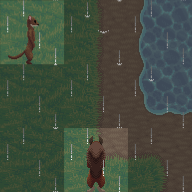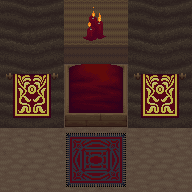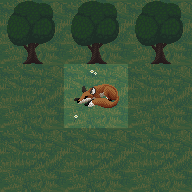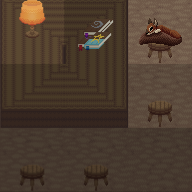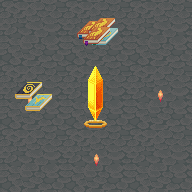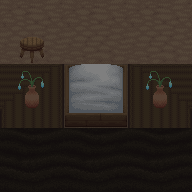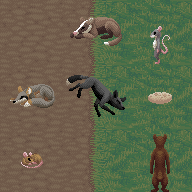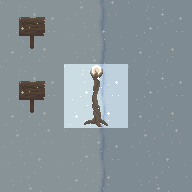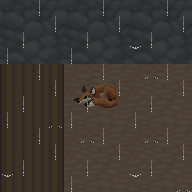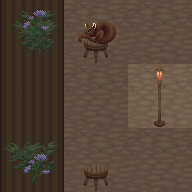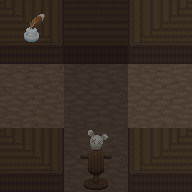Combat
The benefits to making a character who can hold their own in combat are many. Not only does being a capable fighter help you hold onto the things you have, it can, if you so choose, help you acquire things that other people have, potentially for a whole lot less work than alternative methods. Combat can be a secondary consideration you build for, or it can be the entire focus of your character. Combat-focused characters can be bodyguards, soldiers, brigands, good samaritans, bandits, honorable warriors, and more... but since you're here, you probably already know what kind of character you're making, so let's help you make it. This guide assumes that you have read the guides on controls and user interface, so read the relevant portions of those guides if you have not already.
As a reminder, there are no NPCs in Farwoods. That means there are no mobs — there is no grinding for experience, no loot, no raids, no quests except for what evolves naturally from the stories that the community has put into motion. If you make a combat character, the only thing you will be fighting is other players. Please be aware that there are restrictions on how you are permitted to engage other characters in combat and familiarize yourself with the Combat Guidelines. Characters built for combat are still primarily going to be roleplaying.
The first thing to do when building your character for combat is selecting the type of weapon you want to wield. This choice may already be more or less made for you by the race you have chosen; each race usually has a bonus to either Strength or Prowess, which are the primary stats for weapon skills. The weapon skills below are listed in order of the base power of the weapons, from most powerful to least powerful.
- Two-Handed Swords (Strength): By far the most dangerous of weapons, the two-handed sword's incredible damage is offset by the fact that, as its name implies, it requires you to wield it with both hands. It is the costliest weapon to craft and also the slowest and most tiring to wield. Since you will not be able to wield a shield, you will need to rely on Parrying or Dodge for defense.
- Polearms (Prowess): Staves and spears are very common weapon for weaker critters, as they deal decent damage and, importantly, can be made very easily, so it is not difficult for any critter to acquire one. Unlike the bow, they require no additional upkeep compared to any other weapon, and it can be swung fairly quickly; staves even have less stamina cost than a two-handed sword. While all polearms are two-handed and can't be used with shields, their reach gives the user a natural bonus to Parrying. The combined work of a weaponsmith and wood armorer can produce spears with metal heads, which can deal more damage than even one-handed Strength weapons, which is what puts them above them on this ranking.
- Swords (Strength): Swords are the strongest of all one-handed weapons, though not by a great deal; they offer a good trade-off between damage and attack speed/stamina cost without sacrificing too much in either. For each three swings the two-handed sword wielder makes, the one-handed sword can make five in the same amount of time. The sword will still do slightly less damage overall, all else being equal, but the difference is frequently negligible and the sword user will be more flexible in defense. However, the stamina cost for those five swings will be higher than the two-handed sword's three, and if you are able to make only one or two swings, the two-handed sword is far more likely to down your opponent than a regular sword...
- Axes (Strength): Axes are not the ideal one-handed Strength weapon but are perfectly viable. Early on, axes will be easier to acquire than swords, as they use cheap materials. This also makes them easier to manufacture, so there are more likely to be higher-quality axes floating around than higher-quality swords. This is the only advantage they have over swords, otherwise having slightly lower damage potential and slightly higher stamina cost. However, if you prefer the aesthetic of axes over that of swords, in the long run you will only be at a small disadvantage against a sword-user when well-equipped, which can easily be overcome by being better prepared.
- Archery (Prowess): Bows are one of the most powerful weapons available to critters that lack physical strength. Archery allows you to strike at range, possibly from the shadows, and do comparable damage to a sword-wielder at a lower stamina cost. Since wood is easier to find and craft with than iron, an archer will have a much easier time finding good equipment as well, meaning that their power scales to its peak more quickly than most comparable weapons. However, it comes with considerable downsides: first, the bow combines the limitations of the two-handed sword with those of the regular sword. It requires you to use both hands (one for the bow, one for the arrows), and you attack more slowly than with a one-handed sword, but you deal less base damage than either weapon. Additionally, you will need a steady supply of arrows, and you will need to remember to grab more from your inventory if you go through the ones you're holding, or you'll find yourself unexpectedly defenseless.
- Hammers (Strength): Hammers do not deal much damage, and in fact can be completely useless weapons if they are made of weak materials or poor quality. They are quick to swing, but cost comparable stamina to a bow, so they are unlikely to be a combat character's first choice. The primary use of a hammer as a weapon is for smiths who will likely keep one equipped most of the time as a crafting tool, in the best quality they can get. This means that they don't have to expend resources on a separate weapon or remember to switch to it if attacked. Thus, you are unlikely to use hammers unless you are making a smith, in which case they can be quite good.
- Daggers (Prowess): Daggers are an attractive weapon for weaker critters who nonetheless wish to focus on combat. While they have the same drawbacks as hammers in that they do very little damage unless produced with high quality metals, they are one-handed weapons, unlike bows and staves, and can be used with a shield, meaning the character need only invest in one stat to cover both attack and defense. Strong characters cannot take advantage of this synergy; they must invest in another stat for their defensive skill. Thus, the dagger is the sword of smaller, weaker creatures, and bears many of the same advantages over staves, minus the drawback that it's easier to get a good staff than a good dagger. Daggers are also the fastest of the melee weapons with the lowest stamina cost.
- Paw Fighting (Dexterity): Some critters, particularly characters that don't plan to specialize in combat, and those that plan on investing in Dexterity skills anyway, might choose not to take a weapon at all. Instead, they might choose to train with their bare paws, which are always ready for a fight. The upside of paw fighting is that it's entirely self-sufficient, has no maintenance whatsoever, and is extremely fast at a low stamina cost. The downside is that it is also among the weakest forms of attack, which means it is the least effective against armor, it cannot be improved with higher quality weapons, and not investing in a combat stat will limit your stamina and in turn your ability to attack. However, if you do plan to specialize in combat, Paw Fighting has a wide array of sub-skills which can be used to make up all of these disadvantages. Paw Masters can attack with terrifying speed, knocking larger opponents out before they can even raise their sword a second time. Iron Paw users can improve the damage of their strikes to make them comparable to normal weapons. Iron Fur users can make themselves punishing to fight, dealing extra durability damage to their opponent's weapon with each strike. And of course, you can increase your stamina pool with skill points. Don't let its place on this list fool you; a heavily-trained paw fighter can be a more terrifying foe than any other.
- Flinging (Dexterity): The other option for critters that don't plan to specialize in combat is to fling easily-scrounged items at their opponents. This is basically a non-combatant form of archery, using pebbles and acorns instead of arrows. It carries the benefits of requiring only one hand and being swift and cheap on stamina, at the cost of severely reduced damage. Despite this, pebble-flingers can deal as much base damage out of character creation as some poorly-equipped fighters, though they will never outdamage any experienced fighter. Since it can be done at range, this is an attractive combat option for Dexterity-based explorers, who can flee from aggressors and harass them with flung objects.
Once you have selected your weapon skill, you will need to choose a defense skill. The slower your weapon, the more important your defense will be, though it will always be important for the first attack made against you. You can theoretically learn multiple defensive skills, providing layers of protection, but as always specialization is the most effective, so it's better to design your character for only one.
- Shield Use (Prowess): While most attractive for dagger-wielding characters, there is a case to be made for sword and hammer users to choose shields as well. Prowess contributes to your health, so boosting it alongside Strength as your primary combat stat will give you a considerable amount, making you better able to tank punishment. Shield Use is also the only defensive skill which does not consume Stamina when used, allowing the shield user to negate damage without compromising their offensive capability. This helps compensate for the dagger's low damage, but cross-specialized with a sword it can be extremely powerful. The downside is that unlike other defensive skills, the shield's durability is reduced with each successful block, and will eventually break, possibly at an inopportune time, leaving you defenseless. Also, shields have a damage reduction value like other armor, and if it fails to reduce the incoming damage to zero the remainder will "crush through" your block.
- Dodge (Luck): Obviously, the best defense against an attack is not being hit at all. Dodge can make you quite difficult to hit, and is perfect for scrounging characters who need to have high Luck anyway. Given it expends no resources besides Stamina, and requires no equipment, it's great for any character who doesn't intend to stay in combat any longer than they have to. Thus, it's a good skill to pick up even for characters who want to avoid combat, because it will mean you are not completely helpless if caught off guard. However, it is the only defensive skill with which your opponent has an effect on your ability to succeed; the more skilled your attacker is with their weapon, the harder it will be for you to dodge.
- Parrying (Dexterity): Parrying is an attractive defense option for characters whose weapons occupy both hands, or who don't want to invest in Prowess to use shields, or both. It also synergizes excellently with Paw Fighting and Flinging, as unarmed characters can still parry (though they will not be able to completely mitigate the damage as a weapon-user can), and it uses the same stat. The quality of your weapon affects how much the damage is reduced by a parry, so Iron Paw users will be able to parry more damage. The primary benefits of Parrying are that like Shield Use, it is self-sufficient and its success cannot be influenced by your opponent, and unlike Shield Use, it does not damage your weapon on a complete success, there is no risk of crushing through, and it does not require additional equipment. However, it is harder to parry with complete success than it is to block an attack, which may result in extra damage to your weapon. And beware: the weight of your equipment will make it harder for you to parry.
- Armor: Alternatively, you can forego a defensive skill entirely and rely on armor to protect you. Armor provides damage reduction based on its material and quality, and has a chance to reduce incoming damage by that amount based on its type. Heavier, more covering armor has a higher chance to reduce damage. The downside to armor is that all equipment you are wearing will reduce your Dexterity according to its weight, so heavy weapons and armor can make you slower and worse at Dexterity-based skills (including Paw Fighting!). Most combat characters will want to wear at least some armor regardless, because wearing armor can make it extremely difficult for lower-damage weapons to hurt you at all, but if you want to save the skill points you can rely on it entirely. It can be quite effective, as long as you keep it maintained!
Finally, there are a number of useful skills that you may want to keep in mind when creating a combat-focused character. These are optional, but if they synergize well with your build, you can consider picking them up.
- Bash (Strength): Bashing your opponent will stun them for a period of time, and possibly even down them temporarily. A stunned opponent cannot use defense skills and is easier to hit, making this a crucial skill to gain the upper hand against characters with otherwise impenetrable defenses. Downed characters also cannot dodge. However, the skill has a high Stamina cost, so if you are using it in combat, it's better to delegate attacking the stunned critter to a friend.
- Kicking (Prowess): Kicking an opponent will deal a small amount of damage based on the degree of your character's success. This might not sound like much, but the damage cannot be dodged, blocked, or parried, so it's ideal to use against harder targets. If the kick deals enough damage, it can also stun them for a length of time corresponding to the damage dealt, making it a good follow-up to an attack. The opponent will be easier to hit while stunned and cannot use defense skills.
- Disarm (Prowess): This skill gives smaller creatures a better fighting chance against larger ones with more damaging weapons. Disarming your opponent will cause them to drop their weapon on the ground, where they will have to scramble to grab and re-equip it; you might even be able to steal it from them, neutralizing them as a threat to you entirely. Disarm also works on any item a character is holding, though it will prioritize weapons first.
- Viciousness (Craft): This passive skill has a chance to trigger when you deal damage to an opponent. If successful, your opponent will be afflicted with a lasting injury, which might affect their vision, slow them down, or give them a penalty to their skills. A character can only have one injury active at any time, but it may assist you in winning the fight and leave them with a nasty reminder for a little while afterwards. Being good at Viciousness will encourage critters not to tangle with you a second time.
- Tenacity (Fortitude): Tenacity will allow you to shrug off felling blows if you have enough stamina remaining to absorb the damage. This is an excellent skill for combat-focused characters, because you will likely be boosting your Fortitude anyway, since it affects your starting stamina and gives you more health. However, non-combat characters likely won't have the skill points to invest in this skill as well as all their others, and while it's always better to remain conscious than get knocked out and lose a fight, Tenacity can end up sapping Stamina you would otherwise use for attacking or running away, which can leave you in a tight spot.
- Tail Slap (Strength): Races with short tails, like badgers, rabbits, and hedgehogs, do not qualify for this skill, and races with soft tails take a mild penalty to its use. If you can learn it, however, tail slapping is effectively a more powerful version of kicking, stunning more reliably and for longer, at a lower stamina cost. Stunned opponents are easier to hit and cannot use defense skills.
- Tail Sweep (Prowess): The same restrictions apply to Tail Sweep as do to Tail Slap. Tail sweeping fills a similar role as Bash for a lower stamina cost, making it a good choice for Prowess-based combat support characters. It can be useful for characters with slower weapons to keep your opponent from attacking you while you are recovering from your attack. It's also a great tool for a smaller critter to stun their opponent and flee from a fight.
- Fossorial Charge (Strength): This is the badger racial ability, since they do not have access to Tail Slap or Tail Sweep. Fossorial Charge will launch you in a straight line toward whatever direction you are facing at running speed, and if you hit a character, you will lightly damage them and down them. Obviously, this skill is less effective the slower you are, since it will be easier to dodge. Charging is also inherently riskier than bashing, since if you hit a wall or fail the skill, you will down yourself instead of your target. However, charging also downs your target for the greatest amount of time of any skill.
- Quills (Fortitude): This is the hedgehog racial ability. It will deal a small amount of damage to anyone who hits you with an attack. This is an extremely powerful skill, because it is essentially free; it costs no stamina and the damage cannot be dodged, blocked, parried, or reduced by armor. It won't protect the hedgehog entirely from being mugged, of course, but on a combat-capable character it can make fighting the hedgehog extremely punishing.
Building a Fighter
(top)There are several stats you may want to prioritize depending on the skills you have chosen above. The first is your weapon stat; most likely, you will want this to be your highest stat on a combat-focused character, or at least 10 otherwise, to ensure that you are capable of actually hitting with your weapon. Characters with poor weapon stats will be largely useless in a direct fight, and only marginally better if they invest skill points into those skills, so if you plan on defending yourself you will need to make sure this stat is as high as you can afford.
Second is your defense stat. Unless you've chosen armor as your means of defense, you will want to ensure your defense stat is at least 10. If you are making a tanky character, or you don't plan on fighting back, you may want to make this your highest stat instead, as it will help keep you upright for longer and is more cost-efficient than relying on health. And last, if you want to take any defense skills, try and make sure those stats are at least 10 as well, but don't spread yourself too thin, and don't take any points away from your weapon and defense stats to do so.
You may think that boosting your combat stats as high as possible is always the best choice, but this isn't the case! There is a soft cap on how much your stat score affects the benefit you receive for each level in a skill. This cap starts at 10, and increases past 20 levels in a skill. You'll still receive a flat benefit for your high stat score in all skills which use the stat, but you will not receive the full benefit of the score until you've invested enough in the skill, whereupon each level will retroactively provide the full benefit. This primarily affects min-maxers, ensuring they can't invest in more skills than anyone else and will not be significantly more competent right off the bat, while characters with average scores are unaffected.
Another important consideration for fighters is their Stamina pool, since all attacks and most combat skills consume it. You won't have time to rest in the thick of a fight, so you want your Stamina pool to be as large as possible. Your starting Stamina is determined by Strength and Fortitude, and your starting Health is determined by Strength, Prowess, and Fortitude combined. Thus, Strength-based characters will have naturally larger Stamina pools, giving them a natural combat advantage, compensated for by the fact that Prowess-based weapons generally require less stamina to attack with.
You can increase your Health and Stamina pools by learning the Iron Will and Perseverance skills, respectively. These skills are governed by Strength, Prowess and Fortitude, but do not think this means you need a high score in all of those stats! Each level in the skill gives 1 point to the respective pool regardless of your stat scores. Having higher scores in all the relevant stats will allow you to learn the skills more quickly and with fewer books, but this is not necessary and you will still be limited by your available skill points. You will likely aim to learn both skills to 50 in the long run anyway. This means that characters using Prowess weapons do not need any points in Strength to improve their stamina, even though the skill is partially based on Strength, and vice versa. Diverting points from other stats to gain Strength or Prowess for Perseverance or Fortitude for Iron Will will cripple your build's potential!
Depending on your stat scores, it can take you up to your fifteenth interval (your first being when you created the character) to reach 200 skill points. This represents two and a half days of active playtime, or just over two weeks of daily 4-hour sessions. This is how long you can expect it to take you to become competent at both your weapon and defense skill with a stat score of 10 in each, without spending any points on anything else. Obviously, you can see accordingly that combat characters take quite a bit of time to get off the ground, though you will likely spend the first week meeting people, roleplaying, and gathering equipment to use for combat anyway. Do not expect to create a new character and begin fighting immediately; you will not be able to pick on anyone but the weakest critters.
You can also probably guess accordingly that combat-focused characters are among the most social you can make. Without any crafting ability or skill in scrounging, you will rely on other characters for everything, from the equipment you use to fight to the food you will need to stay functional for two weeks. You might choose to acquire most of these goods by force, once you're capable of doing so, but even then a lone bandit will likely have difficulty winning fights against more experienced characters, so you'll do much better by joining or forming outlaw gangs or player factions. In short, combat-focused characters are only recommended for highly roleplay-motivated players!
Combat Tips
(top)Combat is not particularly difficult to learn; all defense is automatic, and to attack, you will use either your mouse's double-click or the directional interact keys. The most important thing is managing your Stamina; become familiar with how much Stamina each swing of your weapon takes, and try not to waste it on running if you don't have to, or you will become too exhausted to fight. Moderate use of skills carefully, and be ready to flee if you run out of Stamina to attack with. You can always find your quarry again later.
Finding a sparring partner is both possible and totally reasonable. If it's your first time getting in a fight, don't wait until the stakes are high to practice. The only cost to training is to the durability of your equipment. Your friends and allies will probably be happy to let you beat on them if it makes you a better fighter, particularly if you have a safe burrow to do it in. Health and Stamina are easily regenerated, after all.
Well-established combat characters will typically have one or more defensive strategies that will give them an edge over newer fighters. Whether it's dodging or blocking or parrying, it can be tough to even land a blow. Consider investing in a utility skill to even the odds! Bash and Kicking can be taken by any combat character and will make it a lot easier for you to deal damage to characters that would otherwise trounce you in a fair fight.
That's the end of this guide. Feel free to return to the index and check out the others available to help you plan your characters!
